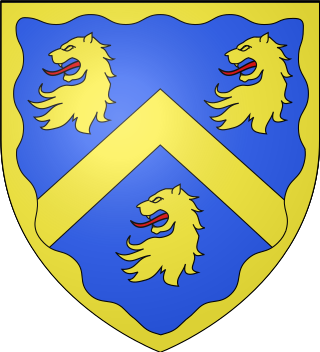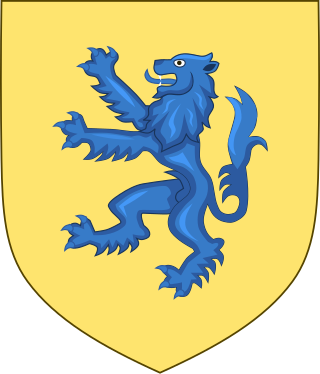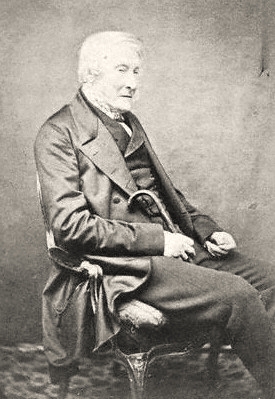Related Research Articles

Duke of Northumberland is a noble title that has been created three times in English and British history, twice in the Peerage of England and once in the Peerage of Great Britain. The current holder of this title is Ralph Percy, 12th Duke of Northumberland.

Baron Leconfield, of Leconfield, in the East Riding of the County of York, is a title in the Peerage of the United Kingdom. It was created in 1859 for Col. George Wyndham (1787–1869). He was the eldest illegitimate son and adopted heir of George Wyndham, 3rd Earl of Egremont (1751–1837), by Elizabeth Ilive, his future wife, from whom he inherited Petworth House in Sussex, Egremont Castle and Cockermouth Castle in Cumbria and Leconfield Castle in Yorkshire, all formerly lands of Josceline Percy, 11th Earl of Northumberland (1644–1670), inherited by Charles Seymour, 6th Duke of Somerset (1662–1748), on his marriage to the Percy heiress Elizabeth Percy (1667–1722) and inherited as one of the co-heirs of his son Algernon Seymour, 7th Duke of Somerset, 1st Earl of Egremont (1684–1750), by the latter's nephew Sir Charles Wyndham, 4th Baronet (1710–1763), of Orchard Wyndham in Somerset, who inherited by special remainder the earldom of Egremont. The 1st Baron's eldest son, the second Baron, represented West Sussex in the House of Commons as a Conservative. He was succeeded by his eldest son, the third Baron, who served as Lord Lieutenant of Sussex from 1917 to 1949. The latter's nephew, the sixth Baron, served as Private Secretary to Prime Minister Harold Macmillan from 1957 to 1963. In 1963, four years before he succeeded his father in the barony of Leconfield, the Egremont title held by his ancestors was revived when he was raised to the peerage as Baron Egremont, of Petworth in the County of Sussex. As of 2017 the titles are held by his son, the seventh Baron. Known as Max Egremont, he is a biographer and novelist.

Lanhydrock House, commonly known simply as Lanhydrock, is a country house and estate in the parish of Lanhydrock, Cornwall, UK.

Henry George Percy, 7th Duke of Northumberland,, styled Lord Warkworth between 1865 and 1867 and Earl Percy between 1867 and 1899, was a British Conservative politician. He served as Treasurer of the Household under Benjamin Disraeli between 1874 and 1875 and was Chairman of the National Union of Conservative and Constitutional Associations from 1879 to 1883.

Viscount Clifden, of Gowran in the County of Kilkenny, Ireland, was a title in the Peerage of Ireland. It was created on 12 January 1781 for James Agar, 1st Baron Clifden. He had already been created Baron Clifden, of Gowran in the County of Kilkenny, in 1776, also in the Peerage of Ireland. The Viscounts also held the titles of Baron Mendip in the Peerage of Great Britain from 1802 to 1974 and Baron Dover from 1836 to 1899, when this title became extinct, and Baron Robartes from 1899 to 1974, when this title became extinct, the two latter titles which were in the Peerage of the United Kingdom. The interrelated histories of the peerages follow below.

General Lord Henry Hugh Manvers Percy, was a British Army officer and a recipient of the Victoria Cross, the highest award for gallantry in the face of the enemy that can be awarded to British and Commonwealth forces. Outside his military career he was briefly a Conservative Member of Parliament.

The Percy family is an ancient English noble family. They were among the oldest and most powerful noble families in Northern England for much of the Middle Ages. The noble family is known for its long rivalry with the House of Neville, another family powerful in northern England during the 15th century. The feud between the two families, known as the Percy-Neville feud led to the Wars of the Roses, at the time known as the Civil Wars, in England.

The Bullingdon Club is a private all-male dining club for Oxford University students. It is known for its wealthy members, grand banquets, and bad behaviour, including vandalism of restaurants and students' rooms. The club selects its members not only on the grounds of wealth and willingness to participate but also by reference to their education.

Hugh Algernon Percy, 10th Duke of Northumberland, styled Lord Hugh Percy between 1918 and 1940, was a British landowner, soldier and peer. He was the son of Alan Percy, 8th Duke of Northumberland, and Lady Helen Gordon-Lennox. He succeeded to the dukedom of Northumberland in 1940 when his brother, the 9th Duke, was killed in action in World War II.

Henry George Alan Percy, 9th Duke of Northumberland was the son of Alan Percy, 8th Duke of Northumberland and Lady Helen Gordon-Lennox.

Alan Ian Percy, 8th Duke of Northumberland, was a British peer, army officer, and newspaper proprietor.

Lieutenant General Hugh Percy, 2nd Duke of Northumberland was an officer in the British army and later a British peer. He participated in the Battles of Lexington and Concord and the Battle of Long Island during the American War of Independence, but resigned his command in 1777 due to disagreements with his superior, General William Howe.

George Percy, 5th Duke of Northumberland PC, styled Lord Lovaine between 1790 and 1830 and known as the Earl of Beverley between 1830 and 1865, was a British Tory politician. He served as Captain of the Yeomen of the Guard under Sir Robert Peel between 1842 and 1846. He succeeded to his peerage on 12 February 1865, after the death of his childless cousin Algernon Percy.

The Major-General commanding the Household Division commands the Household Division of the British Army and is also the General Officer Commanding London District. In British Army parlance, "The Major-General" always refers to the Major-General commanding the Household Division. The Major-General has sole responsibility for the Service aspect of all State and ceremonial occasions within London District. The office holds executive command of the Household Division and of any other units brought into London for providing military security to the Sovereign, the Royal Palaces as well as for ceremonial purposes and is the main channel of communication between the Household Division and the Monarch. He or she is appointed by The Sovereign, and will previously have commanded a Regiment or Battalion within the Household Division.
Colonel Lord Algernon Malcolm Arthur Percy was a British career soldier and Conservative politician who sat in the House of Commons from 1882 to 1887.

Thomas Charles Reginald Agar-Robartes was a British Liberal politician.
General Charles Rainsford was a British Army officer.
Honouring individuals buried in Westminster Abbey has a long tradition. Over 3,300 people are buried or commemorated in the abbey. For much of the abbey's history, most of the people buried there besides monarchs were people with a connection to the church – either ordinary locals or the monks of the abbey itself, who were generally buried without surviving markers. Since the 18th century, it has become a prestigious honour for any British person to be buried or commemorated in the abbey, a practice much boosted by the lavish funeral and monument of Sir Isaac Newton, who died in 1727. By 1900, so many prominent figures were buried in the abbey that the writer William Morris called it a "National Valhalla".
Arthur Victor Agar-Robartes, 8th Viscount Clifden, MC was a British Army officer and English cricketer.
Lord Richard Percy was an English zoologist with an aristocratic and military background, best known for his specialist research on lampreys. He had a long association with Newcastle University and the field of Northumbrian natural history. Having published some work in East Africa in the early 1950s, he also undertook research on behalf of the U.K. government into the ecology of seabirds in the Seychelles.
References
- 1 2 3 4 5 6 7 "Obituary: Lord William Percy". The Times . The Times Digital Archive. 11 February 1963. p. 14.
- ↑ A Genealogical and Heraldic History of the Peerage and Baronetage, the Privy Council, Knightage, and Companionage. Harrison & Sons. 1913. p. 1464. Retrieved 31 August 2024.
- ↑ Trust, National. "The Bullingdon Club in the quadrangle of Christ Church. The Hon. Thomas Charles Reginald Agar-Robartes, later Captain the Hon. Thomas Charles Reginald Agar-Robartes (1880-1915) is sitting in the second row, two from left and has a flower in his lapel. 889936.9". www.nationaltrustcollections.org.uk. Retrieved 3 April 2021.
- ↑ "Percy, Col Lord William (Richard), (17 May 1882–8 Feb. 1963), late Grenadier Guards". WHO'S WHO & WHO WAS WHO. 2007. doi:10.1093/ww/9780199540884.013.u48391. ISBN 978-0-19-954089-1 . Retrieved 3 April 2021.
- ↑ "Deaths". The Times . The Times Digital Archive. 27 June 1984. p. 1.